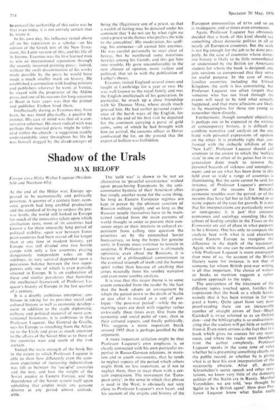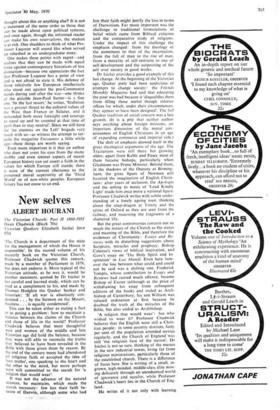Shadow of the Urals
MAX BELOFF
Europe since Hitler Walter Laqueur (Weiden- feld and Nicolson 65s) At the cnd of the Hitler war, Europe ap- peared to be economically and politically prostrate. A quarter of a century later, econ- omic growth had long enabled production and the standard of living to surpass the pre- ar levels; the world still looked to Europe for much of the innovative talent upon which civilisation rests; most of its countries had known a for them unusually long period of political stability; open war between Euro- pean countries had been staved off for longer than at any time in modern history; yet Europe was still divided into two hostile camps with only a few countries playing dangerously independent roles on the sidelines; its very survival depended upon a precarious balance between the two super- powers only one of which is even partially situated in Europe. It is an exploration of these and similar paradoxes that furnishes the intellectual framework of Professor La- queur's history of Europe in the last quarter of a century.
It is a doubly ambitious enterprise; am- bitious in taking for its province social and cultural history as well as economic develop- ment in addition to the staple diplomatic, military and political material of more con- ventional historians; it is ambitious in that Professor Laqueur, like General de Gaulle, secs his Europe as stretching from the Atlan- tic to the Urals and gives as much attention to the affairs of the Soviet bloc as to those of the countries west and south of the iron curtain.
Indeed the main strength of the booklies in the extent to which Professor Laqueur is able to show how differently even the com- mon experience of increasing industrialism was felt as between the 'socialist' countries and the rest, and how the weight of the Soviet empire in Eastern Europe. and the dependence of the Soviet system itself upon upholding that empire made any genuine detente at any period almost unthink- able. The 'cold war' is shown to be not an alternative to 'peaceful co-existence' wished upon peace-loving Europeans by the anti- communist hysteria of their American allies but simply another name for the same thing. So long as Eastern European regimes are kept in power by the ultimate sanction of Russian military might, and so long as the Russian people themselves have to be main- tained isolated from the main currents of world thought in order to prevent their con- sumer urges or their interests in cultural ex- periment from calling into question the priorities set by the entrenched Soviet bureaucracy, so long the hopes for genuine unity in Europe must continue to remain in suspense. If Professor Laqueur is ultimately optimistic, even about the Russians, it is because of a philosophical commitment to the eventual triumph of truth and the human spirit rather than because of anything that arises naturally from his sombre narrative and even more sombre analysis.
It is true that this major theme is to some extent concealed from the reader by the fact that the book adopts an arrangement by which the period down to the death of Stalin or just after is treated as a sort of pro- logue--'the post-war period'—while the re- maining years are dealt with together rather awkwardly three times over, first from the economic and social point of view, then in their cultural aspects, and finally politically. This suggests a more important break around 1955 than is perhaps justified by the argument.
A more important criticism might be that Professor Laqueur's own emphasis is so clearly connected with his own particular ex- pertise in Russo-German relations, in marx- ism and in youth movements, that he tends to neglect aspects of the period which others might think no less important, or if not to neglect them, then to treat them with a cer- tain imprecision. The movement for 'Euro- pean unity', in the sense in which that phrase is used in the West. is obviously not very close to Professor Laqueur's own heart, and his account of the origins and history of the
European communities of EFTA and so on is inadequate, and at times even erroneous.
Again, Professor Laqueur has obviously decided that a book of this kind should say something about domestic politics in all or nearly all European countries. But the scale is not big enough for the job to be done pro- perly. In the case of countries whose dome- stic history is likely to be little remembered or understood by the British (or American) student for whom the book is designed, one gets versions so compressed that they serve no useful purpose. In the case of more familiar countries including the United Kingdom, the scale is less constricting, but Professor Laqueur too often forgets that someone who has not lived through the events will need to be told what actually happened, and that mere allusions are likely to be meaningless for those too young to remember them directly.
Furthermore, though complete objectivity is perhaps not to be expected in the writing of contemporary history, it is difficult to combine narrative and analysis on the one hand with personal expressions of opinion on the other. It is probably right that, con- fronted with the imbecile nihilism of the 'New Left', Professor Laqueur should call attention to the extent to which the 'welfare state' in one or other of its guises has in one generation done much to remove the personal hazards of sickness and unemploy- ment: and to see what has been done in this field over so wide a range of countries is illuminating. But the same cannot be said, for instance, of Professor Laqueur's personal diagnosis of the reasons for Britain's economic troubles over the period, or of the reasons that have led her to fall behind in so many aspects of the race for growth. It is not that his interpretations are particularly novel or outrageouS; it is just` that amateur economics and sociology sounding like the echoes of leading articles in the Times or the Economist are out of place in what purports to be a history. One has only to compare the analysis here with what is said elsewhere about Eastern Europe to recognise the difference in the depth of the treatment. Again, while no one can be omniscient, and while Professor Laqueur is more omniscient than most of us. the account of the British literary scene for instance, is not that of someone for whom British post-war writing is all that important. The choice of writers or books to mention suggests a rather random approach to the topic.
The unevenness of the treatment of the different topics touched upon, fortifies the impression that the book as a whole leaves. namely that it has been written in far too great a hurry. Quite apart from very poor proof-reading there are an inexcusable number of straight errors of fact—Hugh Gaitskell is twice referred to as an Oxford don—and the bibliography is so undiscrimin- ating that the student will get little or nothing from it. Even more serious is the fact that in a book which gives no sources for any state- ment, and where the reader must therefore trust the author completely, Professor Laqueur speaks in the same tone of voice whether he is presenting something clearly on the public record, or whether he is giving what is at best his own interpretation of the necessarily obscure. After all, despite Khrushchev's secret speech and other reve- lations, we know very little of the domestic politics of the Stalin era in Russia. Marshal Voroshilov, we are told, 'was thought by Stalin to be a British agent'. How does Pro- fessor Laqueur know what Stalin really thought about this or anything else? It is not a statement of the same order as those that can be made about open political systems, and once again, though the informed reader can make his own reservations, the student is at risk. One shudders to think of what Pro- fessor Laqueur will sound like when served up rehashed in an undergraduate essay.
One makes these points with regret—and realises that they can be made with equal force against contemporary historians of less distinction—because one appreciates the fact that Professor Laqueur has a point of view and is not afraid to state it. His defence of those relatively few European intellectuals who stood out against the pro-Communist trends during and after the war—one thinks of the pitiable lean-Paul Sartre—is a fine one. 'In the last resort,' he writes, 'Stalinism was a greater threat to the cultural values of the West than Franco or Salazar, and it demanded both more foresight and courage to stand up and be counted at that time of peril than to stay neutral'. Since we still have the `no enemies on the Left' brigade very much with us—as witness the attempt to tor- pedo the magazine Encounter a little while ago—these things are worth saying.
Even more important is it that an author who does not avert his eyes from the many shabby and even sinister aspects of recent European history can yet assert a faith in the values for which Europe still stands; there is none of the current obeisance to the presumed moral superiority of the 'Third World' or of non-white peoples. European history has not come to an end.



































 Previous page
Previous page